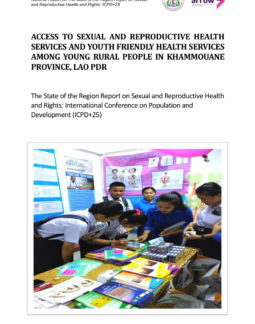Access to Sexual and Reproductive Services and Youth Friendly Services Among Young Rural People in Khammouane Province, Lao Pdr
For many youth around the world, and especially unmarried young women and those marginalised by ethnicity or other markers of inequality, the right to reproductive health remains elusive. The objective of this study was to examine the access youth from ethnic minority populations have to basic sexual and reproductive health services. The study also sought to understand their perceptions and those of key community members of the characteristics of youth friendly health services (YFHS) for young marginalised people in the Lao PDR.
Methodology
This was an exploratory, qualitative study undertaken in two districts of Khammouane province, in central Lao PDR. We undertook focus group discussions (N = 8), and in-depth interviews (N = 8) with young people from minority backgrounds aged 15-24 years. We selected this population because of their multiple markers of disadvantage (e.g. ethnicity, health literacy, low socio-economic status and remote location). In addition to interviews with young people, we conducted interviews with 8 health care providers and 32 community leaders (8 villager leaders, 8 village health volunteers, 8 parents and 8 teachers). All data was collected between 29 June to 10 July 2018. Data analysis was performed by using the inductive approach.
Results
The study revealed early sexual debut and marriage with early marriage often the result of unplanned pregnancy. While having some understanding of ontraception, the young people included in this study were often unaware and uninformed about other reproductive health issues and most did not recognize the health and social risks associated with early marriage, early pregnancy and childbirth, and STIs. Incomplete understanding among community members was also evident, which, alongside taboos around discussing pre-marital sex, act as barriers to promoting sexual and reproductive health for unmarried minority youth. Individual, socio-cultural and service provider factors were factors affecting minority youth access to SRH services. These factors included cultural beliefs and restrictions imposed by parents and community; shyness and fear of parents. Differences were observed between married and unmarried young people with married young people having much better access to services than unmarried young people. Furthermore, while married young people felt comfortable using public services, unmarried young people relied mainly on private pharmacies and self-treatment.
Most of youth and the key informants were unaware of the concept of YFHS. The main characteristics of YFHS proposed by participants were convenient location and operating hours, able to maintain privacy and confidentiality, affordable and with specially trained staff supported by national guidelines, and a hotline for young people.
Conclusion
The types of SRH services available to male and female minority youth were limited to contraception, mainly condoms, pills, and injectable contraception. Access to SRH services by the male and female youth can be improved through community awareness, providing sexual and reproductive health education, use of media, building youth-friendly centres. Youth-friendly centres or clinics should aim to bring SRH services close to adolescents/ youth. The government and other stakeholders should also hold community awareness and sensitization programmes on benefits of SRH services to pave the way for cultural acceptance and use of services by male and female youth.
Health care providers at health centres should be responsible of all activities regarding adolescent/youth reproductive health in each health centres catchment area including schools, community and at the health facilities. Selected health care providers at the provincial and district hospitals, health centres could be trained to offer the minimum package with special emphasis on non-verbal communication skills, active listening, and the ability to deal with sensitive topics. Failure to improve access to young people will not only affect their overall health, but also their education, employment and economic prospects.
Corporate Author: Vanphanom Sychareun, Visanou Hansana and Jo Durham
